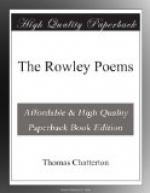All hayle, Contente, thou mayde of turtle-eyne,
As thie behoulders thynke thou arte iwreene,
To ope the dore to Selynesse ys thyne,
And Chrystis glorie doth upponne thee
sheene.
Doer of the foule thynge ne hath thee
seene;
In caves, ynn wodes, ynn woe, and dole
distresse,
Whoere hath thee hath gotten Selynesse.
ONN JOHNE A DALBENIE, by the same.
Johne makes a jarre boute Lancaster and
Yorke;
Bee stille, gode manne, and learne to
mynde thie worke.
THE GOULER’S REQUIEM, by the same.
Mie boolie entes, adieu! ne
moe the syghte
Of guilden merke shall mete
mie joieous eyne,
Ne moe the sylver noble sheenynge
bryghte
Schall fyll mie honde with
weight to speke ytt fyne;
Ne moe, ne moe, alass!
I call you myne:
5
Whydder must you, ah! whydder
must I goe?
I kenn not either; oh mie
emmers dygne,
To parte wyth you wyll wurcke
mee myckle woe;
I muste be gonne, botte whare
I dare ne telle;
O storthe unto mie mynde! I goe to
helle. 10
Soone as the morne dyd dyghte
the roddie sunne,
A shade of theves eche streake
of lyght dyd seeme;
Whann ynn the heavn full half
hys course was runn,
Eche stirryng nayghbour dyd
mie harte afleme;
Thye loss, or quyck or slepe,
was aie mie dreme; 15
For thee, O gould, I dyd the
lawe ycrase;
For thee I gotten or bie wiles
or breme;
Ynn thee I all mie joie and
good dyd place;
Botte now to mee thie pleasaunce
ys ne moe,
I kenne notte botte for thee I to the
quede must goe. 20
THE ACCOUNTE OF W. CANYNGES FEAST.
Thorowe the halle the belle han sounde;
Byelecoyle doe the Grave beseeme;
The ealdermenne doe sytte arounde,
Ande snoffelle oppe the cheorte steeme.
Lyche asses wylde ynne desarte waste
5
Swotelye the morneynge ayre doe taste,
Syke keene theie ate; the minstrels plaie,
The dynne of angelles doe theie keepe;
Heie stylle the guestes ha ne to saie,
Butte nodde yer thankes ande falle aslape.
10
Thus echone daie bee I to deene,
Gyf Rowley, Iscamm, or Tyb. Gorges
be ne seene.
THE END. [Illustration]
[NOTE ON THE GLOSSARY
The following glossary was compiled by Tyrwhitt before he had discovered Chatterton’s use of Kersey’s and Bailey’s dictionaries (vide Introduction, p. xxviii) and a number of words were thus necessarily left unexplained by him. The present editor has added, in square brackets, explanations of all these words except about half-a-dozen which neither Kersey’s Dictionarium Anglo-Britannicum (K.), nor Bailey’s Universal Etymological Dictionary (B.), nor the glossary to Speght’s edition of Chaucer (Speght), nor the notes of Prof. Skeat in his 1871 edition (Sk.), nor any native ingenuity of his own has served to elucidate.]




